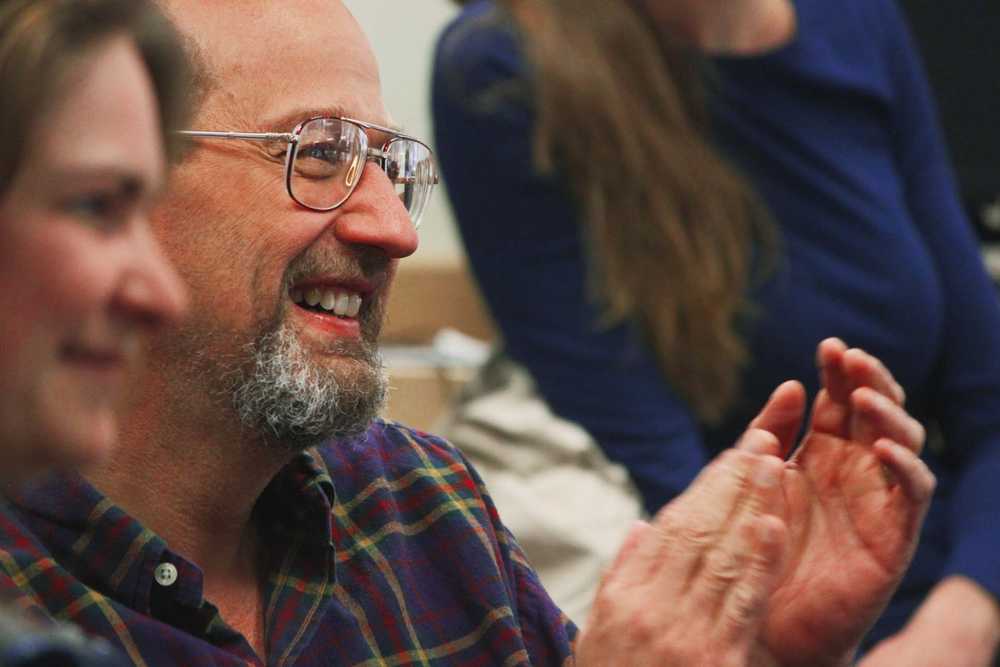There’s an innate power in storytelling — especially when the narrative wraps culture, struggle, tragedy and triumph into the tale.
For the sixth year, the Alaska Native Oratory Society, or AkNOS held a regional open-mic event and this year about 25 people gathered in the commons at Kenai Peninsula College, Kenai River Campus in Soldotna.
Emcee Jack Dalton, who will also be leading the statewide gathering in Anchorage, kept the crowd entertained as “Gruncle Jerome.”
The character is a fictional representation of an Alaska Native elder named after Dalton’s own great-uncle.
Dalton’s character brought laughter to tragedy, a common theme during the event. Stories touched on suicide, assault, addiction and salvation.
“My cousin put it one time, she said, we laugh through our tears as a way of coping with the difficult things we have to face,” Dalton said.
As he stood in front of the room in a hand-dyed kuspuk, a long hooded traditional garment with a large pocket in the front, Dalton called members of the audience into getting up to share their stories.
Sandra King, a visiting teacher from the Lower Kuskokwim school district, jumped up to speak near the end of the day — though she had not signed up to do so beforehand.
King told the crowd that they had inspired her before she started talking about her life.
“They used to dig really deep for outhouses and after you fill up your (honey bucket) you go to the thing to dump them out,” King said.
Her father decided to empty the family’s honey buckets one day and as he was getting ready to go, her brother asked where he was going, King said. Her father joked that he was going to heaven.
“He got the buckets and he went out and he forgot they had a dug a hole,” King said. “It was dark, there was no electricity at that time.”
Consequently, he fell into the ditch and spilled the family’s excretions all over himself.
“He came back and knocked on the door and my mother opened the door and she went ‘whew, is that what heaven smells like,’” King said as the several in the audience burst into laughter.
The stories poured out, Phillip Kopanuk spoke of his sister’s death from alcohol poisoning; Marvin Kiokun energetically mimed being seasick near Nunavik Island on his grandfather’s boat; Jayne Hanna wove a tale of being transported back in time and easing into the serenity of village life — it became apparent that some struggled with speaking in front of crowds.
Kopanuk’s tale of trying to revive his sister and finding salvation in a bible left in the hospital waiting room, was delivered in a quick monotone as Kopanuk looked down at the paper in his hands.
But, at times, he slowed and looked up at the crowd to talk about the power of his own alcohol addiction and how important it was to recognize the destruction that substance abuse was wreaking on the lives of Alaska Native people.
The power of his emotion carried into the audience. Several nodded along while he was speaking and the applause was loud and long when he finished.
“I think everyone is a storyteller,” Dalton said. “What makes someone not a good public speaker isn’t the speaking part, it’s the public part.”
Dalton said the AkNOS events gave people the chance to share the things that hold value in their lives.
He pointed to another speaker whose story revolved around three “epic fail” suicide attempts.
The story, that speaker said, had been shared more than 50 times in front of audiences around the country — but he still stuttered through portions of it.
“That, to me, is absolutely extraordinary,” Dalton said. “That is, to me, the power of our oratory tradition that our ancestors — if something really difficult needed to be addressed — they would have stood up and spoken about it no matter how uncomfortable it was.”
Several of the storytellers acknowledged their nerves as they spoke and Dalton said the AkNOS events were designed to encourage people to develop their voices, especially when it came to addressing issues that Alaska Native people have faced, like the Alaska Native Claims Settlement Act and being taken away from their villages and put into boarding schools.
“If we don’t have people that can speak to those issues and speak up about those issues — then we could get steamrolled again,” Dalton said.
Reach Rashah McChesney at rashah.mcchesney@peninsulaclarion.com

